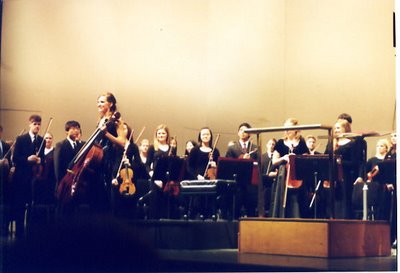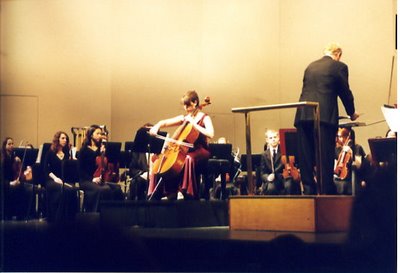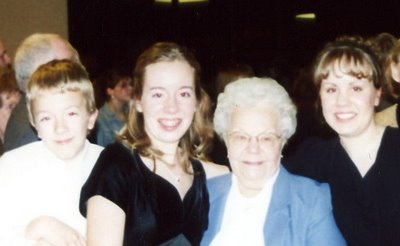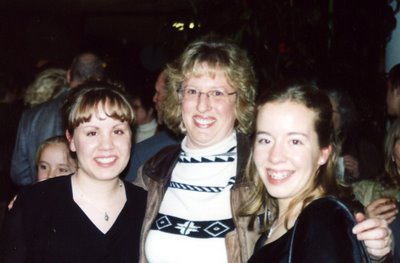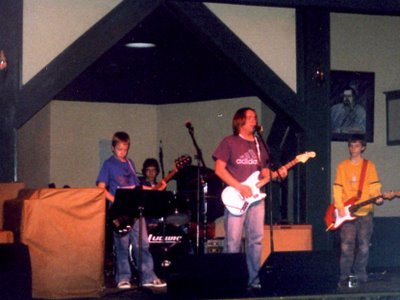“I can’t believe it. There’s been a drought here for over two years, and today it decides to rain. Just my luck.”
She looked up at the quickly darkening sky, and felt a few stray drops on her nose and cheeks. The warm August breeze turned suddenly cool, and the late afternoon light changed from a carefree shade of gold to an almost troubled hue of blue-grey. There was no reason that she shouldn’t welcome the much needed rain, but today of all days. She reflexively hugged her graceful arms around herself wishing that she had a shawl or a sweater. The sleeves of her knee-length sundress came only to her elbows, and she shivered as the temperature dropped and the wind picked up, blowing her soft brown hair in her face. Something in the air, a faint smell of the clouds ready to pour, made her quicken her pace, as some early autumn leaves danced around her ankles.
Materia was on her way home from her piano lesson, and she was supposed to stop by the grocery store to pick up a few things for her parents’ twenty-fifth wedding anniversary party. They sky, however, had different plans for this sunny day. When the first big drops began to fall, Materia knew that she had only a few moments before she would be soaked to the skin. She quickly ducked under a green veranda, one of many that jutted out along the busy city street. Most people outside had the same idea as her—mothers pulled their children inside and business men hurried into meetings or cars. There was a clap of thunder and the rain poured as if God were crying for his Son, just now dead on the cross. Everything was instantly covered in grey; the heavy rain made it look like someone had pulled an ash-colored veil over her eyes. Materia inhaled the comforting smell of this sudden shower, feeling the moisture seeping into her, though she remained dry under the canopy.
Leaning against the outside wall of an obscure bookstore, she was startled out of her reverie by the bell on the shop’s door.
“Hey, miss, you’d be more than welcome to come inside for a while.”
A young man about her age stood in front of her, holding the door open and beckoning her inside.
“I don’t think you want to catch a cold out here.”
He was dressed like a college student, maybe I’ve seen him at school, Materia thought, and under his arm he held a worn copy of Anna Karenina. He was well built, towering a good ten inches above her, and he carried himself in a way that reminded her of a football player, or a ballet dancer. She saw in his face a natural openness that came from his daily interaction with people. But in stark contrast to his cheerful disposition, his eyes held a deep sadness, and his handsome face could not hide some engraved tragedy.
All of this Materia observed in the second and a half before she replied, “Okay, thank you.”
Stepping into the bookstore, Materia felt a sense of familiarity, for the tall bookcases stuffed to capacity reminded her of the many rooms in her home filled with books. The shop was no bigger than her living room, and the thousands of books made it seem even smaller, but she could feel a an openness as big as the whole world, because she knew that these books were the lifeblood of man’s history and stories and genius. They were thousands of doors to every part and every age of the earth. To the right of the entrance in a corner of the tiny store was the sales counter, where the young man had resumed his place.
Materia browsed over the nearest shelf, every now and then running her hand along the uneven and colorful rows. She estimated no less than fourteen ceiling-high bookshelves, with probably a thousand volumes on each one. The aisles were barely wide enough for two people, but her slim body moved easily among the shelves. She spied a storage room, where there rested at least two more full bookcases.
“Do you think you’ll ever read them all?” Materia asked.
The young man smiled and said, “When I was little, maybe eight years old or so, I always told my father that I would read every one. Each day after school I’d come in here and take a book off a shelf and read until he closed the store. By the time I was finished with high school I had read through nearly three whole shelves. These days I don’t make as good of progress, with university classes and actually working here.”
He smiled again, and so did Materia. She pictured him as a little boy, his bright face smiling under a crown of unruly black curls, running from the confines of times tables and fractions to take an afternoon journey to another part of the world. I wonder if he still has that curiosity, she thought, looking over at him. His eyes were taking in the spectacle outside, and occasionally he would look back down at his book, but he couldn’t resist the rare view of the rain washing the earth, making little rivers in the streets and streaking the window through which he gazed.
Materia watched him for a while, and then walked over to see what held his attention so fixedly. They stood there together, staring at the downpour in a sort of wonder.
“I remember the last time it rained,” he said. “I was nineteen. It was June, I think.”
Materia nodded, not so much to affirm his statement, but to ask him to continue.
“I was working here—I’d just finished my first year at the university. It was a slow day for business, only a dozen people had come in all afternoon. At four o’clock it started to rain. I didn’t think anything of it, because it was the third time that week. The day wore on, and I closed early, ready for a hot supper and a good book. My house is only five blocks away, across the bridge, and on my way home I was drenched in a few seconds. I had forgotten my umbrella in the store, but I was too eager to get home, so I didn’t come back for it.”
His eyes had been fixed on some imaginary object in the distance outside, but now he looked behind him, where a brown umbrella lay on a cluttered desk, amidst piles of invoices and books.
“I’ve never used it since.” He turned his gaze towards Materia, who held it with an equal intensity and searching. The deep pain in his being had surfaced, and she knew that the story was not over, but she did not compel him to continue. Instead, they simply looked at each other, and in that moment it was enough. Materia’s face offered him comfort and patience, and he found in her warm brown eyes the strength he needed to finish.
“He died that night. My father.” He paused, but the rain filled the silence in-between his words. He looked out the window again, towards the place where his life had been changed forever. “I came within sight of my house, and there was my mother, running out to meet me. ‘Ma,’ I called, ‘you’re crazy! Go back inside!’ but in a moment she was in front of me with her arms around my neck. There were drops streaming down her face that had not fallen from the sky. They gave me a hole in the pit of my stomach, and a thousand questions formed in my head, but first I picked her up—she’s smaller that you—and carried her inside. We both soaked the couch immediately, but neither of us noticed. Then she told me, between sobs, that he had lost control of his car on the bridge.”
He stopped again, but this time for several minutes. Materia did not know what to say, so she simply touched his right hand, which was resting on the windowsill. It was trembling, and she steadied it with her own. When he started talking again, she took her hand away.
“I did not cry, not until he was lowered into the ground. I knelt by his grave, the ground was still wet, and I told him that it should have been me.”
“Nonsense,” Materia almost whispered, “it was an accident.” She tried to touch his shoulder, to reassure him, but he pulled away and spoke to the rain.
“We were both here that afternoon. He offered to close up, but I told him to go on home, that I’d take care of it. He wanted to walk home and let me take the car, but I told him to take it. He agreed, and it was the last time I saw him.”
He was crying now, and Materia herself was moved. At first he pushed her away, but finally let her hold him, because the tears had removed the wall around him. Materia hugged him close to her, so close that she could feel his heart beating. As her warmth enveloped him, his pain likewise flooded her. For a minute or an hour, neither of them knew, they stayed like that, as Materia shared his hurt, and helped him to carry it. When the rain had slowed to a soft drizzle, she released him, and looked into his eyes. He had spoken for so long that he now could not find words of thanks, but Materia saw it in his face.
“I should probably be getting home,” she said.
“Will your family be worried?” he asked anxiously.
“No, I usually spend the day in the city,” she answered. “They would understand.”
Materia picked up her bag, which she had set down by the bookshelf, and turned to leave.
“Hey,” the young man said, “wait a minute while I close up and I’ll walk you home.”
“Thanks,” she said, standing by the door as he locked the cash register and tidied up the desk. Satisfied, he came to follow her out, but she stopped him, and pointed at the desk.
“Better not forget that,” she said gently.
Smiling, his eyes still sad, but now less so, he returned to the desk and picked up the umbrella. He went out first, holding the door for Materia, but when they were both outside, they saw that the rain had stopped, and the sun was bathing the evening in gold once again.
